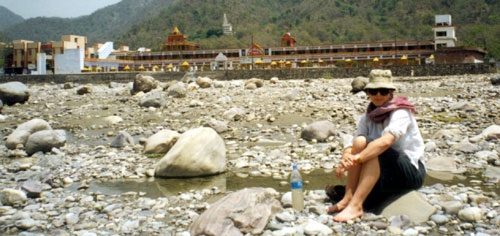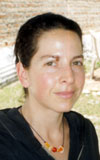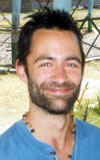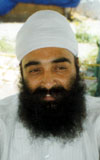















































|
Amy Berk: First off, thank you all for coming. The first thing
that I would like us all to address is how we all came to Rishikesh. I
will start. Andy and I are in the middle of a long trip. We have been
travelling for almost a year, starting in New Zealand (see dinner salon
#2 for more info) for an artist's residency and that was the
impetus for
us to give up our lives in San Francisco. We decided to take a year to
travel and explore and figure out what to do next , to see what else is
out there-- maybe that is why people come to Rishikesh? (but
I don't want
to put words into anybody's mouth). I for one have always
wanted to come
to India and I was very interested in deepening my yoga practice.
Andy Cox: One thing is, we (Amy and I)
don't really like travelling continuously, we like to stop for a
month or two somewhere. It's very tiring travelling and dealing with
new sensory inputs that you have to process all the time, so spending
time in this contemplative environment sounded like a good idea, and
one that I hadn't thought too much about. I've done yoga on and off
for 5 years and haven't committed to it, so the yoga was secondary in
a way but since being here and actually doing it, I've sort of
realized that that has been a very important part of coming here and
getting an insight into the other side of yoga. When you do yoga in
the States, it tends to be more physical, a lot of it is like
aerobics, which is fine but having the other side (meditation) and
learning more about that side has been very good.
Laurent Hugelit: I arrived in Delhi at 4 o'clock
Thursday morning
and at 6 o'clock I was practicing yoga here. I came straight
to Rishikesh.
I came to India to come to Rishikesh. I've always wanted to
come to India,
but I wanted to be ready and not have illusions or be
stereotypical about
what I would find here. So I have been travelling for the
last few years,
I went to South America and to Africa to learn to travel,
because travel
for me is an art. Then I decided to stop working - I left my apartment
and my job and I decided to start travelling in Rishikesh.
The only reason
I am here is yoga, in all of the books I have read about yoga there is
mention of Rishikesh. I've been practicing yoga in a Western
way up 'til
now and I wanted to come to the source and see how it is taught in the
Indian way. I'm learning a lot because the way it is taught
is a bit different.
Amy: Can you put into words how it is
taught differently?
Laurent: It is difficult to make
generalities about that type of thing but I would say…
Ritu Agarwal: …Do you think that it is what Andy
was saying
earlier, more physical than mental in the West and here it is
the reverse?
Laurent: Yes, that's it, and I am most
interested in the meditation part. I'm very interested in
progressing in hatha yoga but what I want to teach is mostly
meditation. I came here because I knew I would have the opportunity
to do hatha yoga very intensely and to improve my hatha yoga.
Andy: We were talking the other day and you
were saying that you were interested in the Buddhist form of
meditation rather than the yoga way.
Laurent: Once again it is my point of view
-- it is never general -- you have your own experience of what you
learn. I've practiced a lot of different types of meditation with
visualization and pranayama (breathing), in Switzerland, and I wanted
to find something more pure, something only with awareness, so I went
to a Vipanassana retreat - 10 days of just silence (in Switzerland
but with similar teaching as here). Since then, I only do
Vipanassana because I want to teach it and it is important to keep
the technique pure and not to mix everything like a big salad.
Surinder Singh: Now (I would like to tell) you the
exact meaning
of yoga. We are doing (in my class) the physical side, but that is only
one part, yoga is more than that, there is also the mental side. Yoga
is a holistic science, not a religion. When you come into
this yoga life,
you try to go deeper and deeper, then you can reach the mental level.
Yoga teaches us about the purpose of life. For the purpose of life, you
try to go for self-realization. In this way we are taking the
characteristics
of body, mind and soul - we are using the body as a tool, doing all of
the asanas to make the body perfect so we can take (absorb) a very good
experience in our lives. If my body is weak I can not take (absorb) the
good experience, if my mind is weak, I cannot take the good experience
and go for higher knowledge and wisdom. The two things together are a
very good instrument - first working on physical well being, and then
we can go on to the deeper knowledge of the soul. The characteristics
of the soul being omniscience, omnipotence and omnipresence.
When we sit
for meditation, we are looking for what is inside, removing all of the
blockages. If you have many disturbances inside you then you cannot sit
for meditation. First you try to analyze yourself and remove
the blockages,
you ask yourself what is the reason for the problems. When the reason
comes to you, it is ultimately coming from the inside. And,
when you find
the solution, you don't stay with that solution, every day you try to
refine the situation, so we can slowly and gradually increase knowledge
to gain higher wisdom. Through yoga we can go for a deeper
level of mind.
Andy: You are talking about personal
experience. What do you think the importance of yoga might be for
the functioning of society?
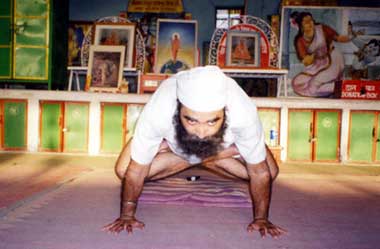
Surinder: Your question is very good. Have you heard
about Ashtanga
yoga? Ashtanga is a Sanskrit word - ashta means limb of yoga, a part of
yoga. The first 2 parts are called yamas and niemas. The second 2 are
asanas and pranayama and the fourth, pratahama and samadi. The first 2
parts, yamas and niemas, create social well being and discipline in the
life. When you have good discipline you automatically have
good societal
behavior. Yoga teaches us to first purify yourself as much as you can.
And when I purify myself, it automatically affects society's behavior.
The other one is the asanas and the pranayamas making
physical well being
because they are taking us to societal well being - that is the meaning
of ashtanga.
Amy: Would you like to take this question
as well Ritu? What do you think is the relevance of yoga to
society?
Ritu: I feel that criticism as well (as
Andy previously noted), a lot of people say that yoga is
individualized. In India, I think it is different. I definitely
feel that it is leading by example. You learn and from this peace
that you achieve, you teach it (peace) to other people. I only got
into yoga because my best friend does yoga and I did it with her. I
couldn't stand long enough to do one asana. She said that she
believed enough in yoga that I would come back to it and I did. I
saw that example through her. In India you definitely don't see far
reaching societal effects because there is such a strong base of
Hinduism that directs society here. I don't feel that devotional
yoga is a strong vehicle for Hinduism, it is a latent rather than a
blatant form.
Surinder: Another thing, especially in this area
(around Rishikesh),
which is called the land of the deities, the healing power is very big
here. We can say that the energy is much stronger in this area - and we
can say that India is a very holistic and spiritual country. We are all
learning from our parents, grandfather, grandmother, and we
are carrying
(information) from very ancient times. India is a spiritual
country, and
we see the Western countries running for the sense pleasures. India is
also running for the sense pleasures so all of that pain and suffering
also comes to us. When you just believe in a spiritual system and come
under that discipline, you can try to reduce pain and suffering.
Andy: That's very Buddhist. Is that a
Buddhist ideal that's been taken into Hinduism or has it been part of
Hinduism?
Ritu: Buddhism is extraordinarily young, it
is only 2500 years old, and if you look at Hinduism, I don't think
you can even put a date on when it actually began. I've had a great
difficulty in understanding Hinduism, especially claiming to be a
Hindu and not knowing what it is. I saw Buddhism as very tangible so
I studied it in Thailand and when I got back to India I spoke with a
sadhu (religious figure) and the Sadhu was telling me all of these
beautiful things that was exactly Buddhism, but is was also Hinduism.
Laurent: Isms! For me, I don't know. Universal truth. There is
no Hinduism, no Buddhism. They all talk about the same thing. The only
difference is cross-cultural difference, difference of technique, but
it is universal. So, is it a part of Buddhism or Hinduism or
Chistianism
or this or that? It is just reality.
Andy: Isn't that Laurentism? The idea of
universal truth is questionable.
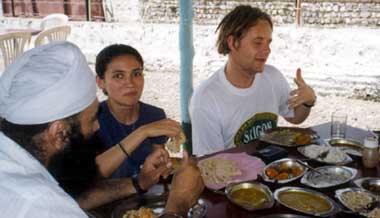
Laurent: Of course, because you have a rational mind
and you like
to question. In Western countries this is the way we work
with our minds.
We are always asking questions but there is no answer because
every time
you answer a question, there is a new question or 2 new questions. When
you came to me and asked me to participate in this lunch salon, I said
that I didn't like to speak about this kind of thing, it is because I
feel there is a lot of discussion and not enough practice.
This is a problem
in Western countries - we study this and study that…it is very
interesting, it gives me a good feeling, I read this book, oh
marvelous,it
is talking about love, about peace but we do not practice… For
me, the main thing coming here for example, is that it could
be beautiful
if people in Western countries started practicing instead of talking.
Do not take it personally.
Andy: Oh no, I was questioning the notion of
universal truth which
I think is something that is more questioned in the West than
it is in…
Laurent: Yes, it is questioned in the West because we
do not realize
it in the West.
Andy: Does it exist? Universal truth?
Where is it?
Ritu: Don't be such a pessimist.
Laurent: I studied Western philosophy for 4 years and
I had that
type of discussion so much because (it is) in the Western way
of thinking.
In Western philosophy, there is no truth because everything is related,
but this is only because we see reality from a rational-mind point of
view.
Andy: Yeah, subject/object dichotomy.
Ritu: Universal truth is interesting, because although I told
you not to be such a pessimist, I'm not the optimist myself.
I'll go outside
and I'll have my wallet on me. My actions are definitely different than
my words, there is a breach between the two…I was
reading this book
talking about Buddhism and love and war, and not having war. (It talked
about) how to maintain peace - is it through nuclear weapons?
Well, nuclear
weapons are just as dangerous as just saying, well, forget it, I just
won't keep any weapons and try to see what happens. They are
both self-destructive.
Why not try the more peaceful one rather than the more destructive one?
But we tend to go to the most destructive one. I feel that human nature
tends to be more destructive, but I think universal truth exists, and
we are coming to see that slowly as we progress as a society.
Andy: Is it a universal truth for example
that desire is evil? I am playing devil's advocate, like desire for
money?
Laurent: It is not. It leads you to
suffering, but it is not evil.
Andy: It leads to suffering, okay, let's not say evil.
Desire leads to suffering. Is that a universal truth?
Laurent: I don't know, you have to realize it to know.
This is realization. In the spiritual disciplines, you realize the
concept, you live and you feel them, and you don't have to talk about
them any more.
Andy: You have to talk about them because somehow that
information has to get from one person to another, it has to be
transmitted. Buddha talked about things, presented his
ideas…
Ritu: I think you guys are talking about two different things.
You (Andy) are talking about a societal level and Laurent is
talking more
about a personal level. I feel like what you (Laurent) are
trying to say
that instead of questioning where did the world begin and
what do I desire,
what do I not desire, instead of questioning, questioning, questioning,
you believe it is better to realize what you desire and deal with that.
I think Andy's question is different, more societal.
Andy: Yes, I'm coming from that angle.
Ritu: I think Laurent's coming from a more personal - maybe.
Laurent: 100% personal.
Amy: Well, I think that what Surinder was saying, and
please stop
me if I'm misinterpreting, but you are saying that with yoga, a healthy
body, healthy mind will create a healthy society. By the
individual being
healthy and spiritual and being a complete (whatever that may
mean) person,
they will create a healthy society.
Surinder: Yes, if you come into discipline in your life,
then that creates a reaction. If I am very humble, very polite with
others then the same things come to me. It will take time, maybe 1
month, 2 months - everyone can change, slow, gradual change.
Amy: It's like the trickle-up vs. the trickle-down theory.
Andy: This is something that I struggle with, what we are
talking about here. My artwork isvery political, for example, I do a
lot of work against capitalism and big corporations and all this type
of thing. I don't know, maybe it has some positive effects. I try
to make it humorous as well, but then I think, maybe it's better to
just look after myself, do my own thing, to look at it as more of a
micropolitics of individual interactions rather than going for the
whole thing and saying this is wrong and making those types of
statements. I'm confused about this issue.
Amy: Well, it is very confusing. It goes back to
individual choice --how do you deal with it? Laurent was talking
about action vs. theory.
(Hermelinda arrives and introduces herself, discussion about
the whereabouts of lunch ensues)
Amy: To recap for Melinda, we were discussing the relevance of
yoga and why we are in Rishikesh as well as other big questions such as
how society thrives and how we best can make that happen. One
big question
that has emerged is how we can work the inner and the outer together,
the inner being ourselves as individuals and the outer being the larger
society. Like Andy, I also struggle with this as my artwork
is very personal,
I use a lot of my old clothes, I work alone in my studio
making my little,
strange totemic objects and then I present then in galleries and other
such places. But, to balance that, I teach inner-city
teenagers and that
really engages me in a social way. I really try to work with
these teenagers,
using art to teach them about life. It is very difficult
because, as Melinda
said in her introduction, especially in America, the society
is very materialistic,
it is all about the car, the apartment, and how to get there. We try to
show the teens that there is a different way, often leading by example
by doing community-based projects. They also help put up shows in the
gallery where the program is based and interact with artists and expand
their knowledge base that way. In sum, we try to make other
options available
to them - teach them that they can do something else besides
work at McDonalds
in order to get drunk on Friday nights. It is the hardest thing to do,
get teens (or anyone) to go outside the box, outside of their
own micro-culture.
Ritu: I think that is the reason that a lot of us came
travelling - we had our own little box. You can find yourself
living in New York City, for example, and only go 4 blocks -- and
that is your life.
Amy: So true, this program with teens, along
with my yoga practice
and inner studio work is what gives my life its balance. Each
person has
to come up with their own balance, the way that they can productively
benefit themselves and society.
Ritu: Sounds like Karma yoga.
Surinder: …Giving unconditional service to others is
when peace comes to us. When giving service to others is conditional,
peace is never given to us. This is called true karma yoga.
Ritu: What was your original question again?
Amy: The original question was why we came to Rishikesh,
and the relevance of yoga for you as an individual and for society.
Perhaps Melinda would like to catch up with this.
Melinda: I came to Rishikesh by coincidence. I didn't plan to
come here. I came to India because I was planning to go to
the south where
they do water quality projects, but in the end, certain complications
occurred -- I was travelling with a friend who was sick, it
was very hot
in Varanasi, we couldn't find a train anywhere except to Rishikesh. It
was lucky and I think that everything happens for a reason.
If I am here
it is because I was meant to be here. I always wanted to do yoga, I was
always curious about it. I don't know about your background, but I grew
up in a family surrounded by friends who never talk about the spiritual
level. And personally, I am always in a hurry, I want things
done quickly
and am very impatient. I think yoga may help me with that. I think that
there are people who can get to a certain point without doing yoga and
others that can do yoga their whole lives but miss the point. When you
are in the city where you live, doing your job, it is really
easy to forget
about it (the spiritual life). It is really easy to get upset because
of a traffic jam or whatever, but now that I am here, I have a chance
to devote my energy to slowing down, and to learning more about things
that interest me. Just seeing other people who live according to what
they say really motivates me.
(Food finally arrives, general lunch conversation about
siblings, birth order, family members connection to
yoga…)
Amy: While we eat, I would like people to think about
their reactions or thoughts about the increasing violence over the
past year. Do you feel worldwide violence and terrorism in general
has increased with the attack on the World Trade Center? However, I
am more interested in the current situation in India with
Hindu/Muslim violence and in Israel with the Palestinian suicide
bombings and Israeli retaliation. Is there more violence now? And,
if so, how can we reconcile the fact that the world seems to be
breaking apart into more and more factions at a time when the world
should be coming together?
Ritu: That is an enormous question.
Andy: I'm just going to throw out an idea on the
reason that terrorism,
particularly fundamentalist Islamic terrorism has increased and why Bin
Laden has a following. It is because since the collapse of an
alternative
to materialist capitalism which is represented by America and
other western
countries, there hasn't been an alternative ideology to oppose it and
I think oppressed peoples are rallying around Islam. Although in some
ways it is worse than American ideology in some of its more fundamental
aspects, I think it gives an alternative to that model which appears to
be taking over on a global scale. So anyone can respond to that.
Melinda: Was that a question?
Ritu: It is interesting that you think Islam is filling in. Is
that how you view it? Because after the Cold War there is no bi-polar
centers of power, now there is just one mentality.
Andy: I think there are no alternatives. What
alternatives are left?
Vietnam, China? All these countries now, you go to Vietnam, Saigon is
just like America, it is more like America then San
Francisco, in a way.
All these great sorts of experiments have ended in brutality
and failure.
Maybe consumerism and capitalism is the only system that keeps people's
innate greed in check while on some level providing for
society. I don't
know, these are questions I ask myself all the time.
Ritu: I haven't thought this out very well, but I have a sense
that it is due to a lot of resentment to misdirected foreign policies
(United States) and unnecessary intervention. So there is a
view now that
there is something to rally around, it might not be Islam
itself but what
Islam represents, not an enemy, but someone who is willing to
face someone
who is persecuting you. If you look at the countries I see
them predominantly
as Third World countries - and why is that? Is religion the real focus
and what is the definition of religion? Can you take that
away from politics?
And then, what does politics mean? Does it take away from the morals of
society?
Andy: I would like Laurent to tackle the question of
whether violence is increasing and if so, why? Or is there a
constant amount that is inevitable?
Laurent: I don’t know if violence is increasing but it has
changed its form. Violence has always existed but we didn't see it. Now
we see it because of the global information system, so we see violence
- we are more aware of it. People are more and more aware of
what's happening,
which is a good thing. I don't know if it is good or bad, but they know
about it. For example, in Switzerland, after the World Trade
Center, there
was an aftershock, an awareness of, yes, we have to take care
of the planet
and to realize that we are alive and this is where we are living and we
are responsible for our acts. Responsibility is something
that is missing,
I think, because you have to know the consequences of what
you are doing.
If you don't, then there is no responsibility, it is always
someone else's
responsibility.
Melinda: You asked if violence has increased after 9/11. I am
not refuting how big and bad the attack was, but I would suggest that
Americans do not know what violence is. I grew up in a country where my
friend has been kidnapped, people that I know have been killed and this
is normal for me. I grew up with this, it is my daily life. People ask
me if Columbia is dangerous. It is dangerous for locals, not
for tourists,
because they will kidnap people that they know have money. 3,000 people
died in the Twin Towers. In Columbia, the 1st cause of death
is not cigarettes, it is not cancer, it is because in the countryside,
there are people shooting each other. I have been lucky because I grew
up in the city and my dad has a good job so I have been able to travel
and see something else. But, there are people there that will never see
something else. When I was little I remember I learned about WWII and
that 6 million Jews were killed. I always wondered how that
happened when
someone could have done something. It is easy, it happened in Vietnam,
in Bosnia-Herzegovina, it wasn't as big as the Twin Towers, it happened
in Afghanistan. It happens all the time, we just don't see it . Now you
say that people are more conscious (of violence) because CNN is showing
the Twin Towers, not the people dying in Afghanistan, they
show the bombs,
but… Besides religion and whatever, war is a business, I just hope
that Columbia is not next , because it is a good business for people to
sell weapons. Panama was invaded 10 years ago because they were looking
for Noriega. They arrived, put bombs everywhere, found the guy and shot
everyone for ten days and it wasn't on the world news. We knew because
it was the country next to us. That could happen in my
country any time.
Bombs can arrive, they can blow up, it will be on CNN and people will
say, oh that is terrible, but…I would say that it has
always happened,
but unless it happens right next to you, you will say, 'oh, okay, ' but
otherwise you will do whatever you do in your normal life.
Amy: I agree. It's very frustrating that there was so
much attention
on 9/11, and I know that I am part of it because I asked that question.
But, coming from New York and being in New Zealand when it
happened, people
asked if I was very upset about this great tragedy. I was
strangely unaffected
- not unaffected of course, but wondering why this was any worse than
any other horrible situation or bombing. Yes, it was in New York which
is where I am from but it was very frustrating to have it singled out
as if it was special…
Andy: I think it is different because of it's symbology.
It is a huge symbolic act to fly these technologically advanced
airplanes into the symbol of American capitalism and to destroy it.
It was horribly brilliant.
Amy: Andy and I had such hope afterward. People were really
talking about US policies and about why people would want to do such
a shocking act. Instead of thinking that America could do no wrong
and was so great, people started questioning why people wanted to
bring down the TwinTowers. A debate did start afterwards and the
idea of rethinking some policies did emerge. Then 3 weeks later they
decided, well, let's not think about it anymore, let's attack
Afghanistan, that must be the answer. Very frustrating.
(Personal discussions re: women travelers, learning Hindi,
Indian men's propensity for staring and how to deal with that. Barfi
appears.)
Amy: I would like to get back on topic for a moment
and hear what
Surinder or anyone else has to say about the Hindu/Muslim violence in
Gujurat. I don't know much about the situation other than it has been
going on ever since Partition and probably before that. My question is,
what can be done? How can we stop it? How can we stop the
violence going
on all over the world?
Surinder: Yoga! Actually the problem is we are not
taking responsibility,
only the leaders are doing all of these things (the
violence). The educated
people are never involved in these activities. The lower
classes are doing
this because they are not aware of other options. Some are doing it for
the money. It is very sharp minds, Muslim/Hindu leaders who are using
the illiterate ones. America makes very good ammunition and we (India)
have asked America for the last 20-30 years to check with us because we
are fighting with Pakistan, but they never listen to us.
After September
11, with what is going on with America, now they understand.
It is normal
for India, it always happens. Every day in Jammu and Kashmir five, ten,
fifteen people die, every day.
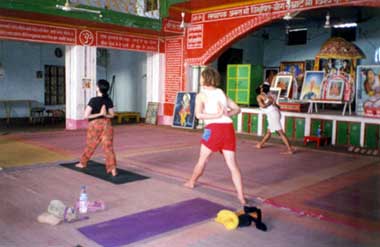
Andy: Why are the powerful people doing it? To consolidate
their own position and maintain power?
Surinder: They only want to attain power, fame and status.
They are not trying to solve the problem, only to create it.
Amy: To keep their power?
Surinder: Yes.
Andy: Pointless really.
Laurent: To have an enemy always gives the impression that
you exist.
Amy: That is one way of getting some sort of physical
reaction. Fear, to know that you are alive.
Laurent: But also mentally because if you have an ideology
fighting against another ideology then you have power because it is
fighting against something. If there is no enemy then there is no
need for ideology, it just disappears.
Amy: It's so interesting what Surinder was saying and that the
people and governments seem so far apart from each other.
Andy and I were
so upset by the US waging war on Afghanistan as their response to the
9/11 bombing that we held a bed-in for peace inspired by John
Lennon and
Yoko Ono's bed-in against the Vietnam war. We spent 48 hours
fasting and
talking with people all over the world about ways to achieve
peace. Almost
everyone, the majority of people we spoke to, people from
Pakistan, Israel,
U.S., Canada and Spain, Japan, etc… wanted peace and the question
was how to get there.
Andy: Nobody would say that they don't want peace.
Amy: People did. There was a few people that said we
have to bomb
them, that that is the only way to teach them a lesson. But
the majority
of people said that they don't think that that is the way to
go and that
people need to come together. And my question is, if people feel that
way, why is it not happening? Government action and people's wants seem
very far apart. Maybe it does all go back to yoga, if
everyone did yoga…
Laurent: Yes, I think what is happening now in the human
consciousness is that we are becoming more and more aware of the fact
that we have to solve our own personal problems before solving other
people's problems. If I suffer, how can I replace suffering in other
people. So, first I start with relieving my own suffering - then my
action is pure because if I act with suffering inside of me or with
anger or hate then my action is not pure. This is karma- there is
action, reaction. You act with hate and you get hate, you act with a
pure mind, pure body, pure heart, then there is only purity coming
back. If you bomb someone, you increase violence and you feel so
powerful, there is always counter-effect. For me, for example, on
9/11 that was a counter-effect for the policies of the US for over 50
years.
Melinda: I think everyone wants peace but no one
wants to do anything
about it. Everyone expects someone else to do it for them. If
in America,
people wrote to the people they voted for - just by writing a
letter they
would say that people will not vote for me if I do not listen to them.
But people do not do that. In Columbia, everyone talks about it a lot
but… I would say that you don't have to do big things, just small
things, like be nice to everybody whether they are rich or poor. If for
example, I want to buy a piece of cake and this person doesn't give me
the cake I want, but instead of being aggressive I might say, it is the
wrong piece of cake or, never mind, I will buy this cake because it is
a good cake and I will eat it. If I scream 'why did you give
me the wrong
cake', this person will have the anger and go to someone else with the
anger. So, if in a normal day everyone tried to be nice with the people
around them, it is exponential.
Laurent: Exactly. |

